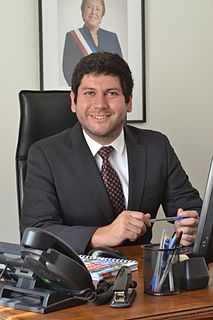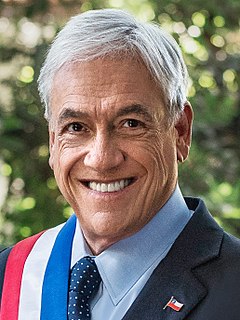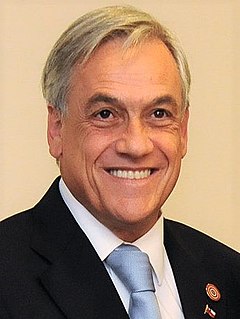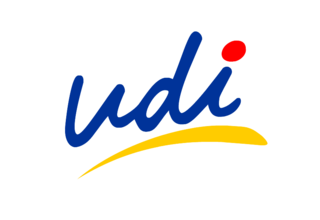
National Renewal is a liberal conservative political party belonging to the Chilean centre-right political coalition called Chile Vamos in conjunction with the Independent Democratic Union (UDI), the Independent Regionalist Party (PRI) and Political Evolution (Evópoli). The party president is the deputy Mario Desbordes, and its principal leaders are Sebastián Piñera, current President of Chile and Andrés Allamand, former minister of defense, former presidential candidate and Senator.

The first round of the Chilean presidential election of 2009–2010 was held on Sunday December 13, 2009. Based on the two-round system, since none of the candidates secured the absolute majority needed to take the presidency outright, a run-off between the two most-voted candidates —center-right Sebastián Piñera and center-left Eduardo Frei Ruiz-Tagle— was held on Sunday, January 17, 2010. Piñera, who won the runoff with about 51.6% of the vote, succeeded Michelle Bachelet on March 11, 2010. Parliamentary elections took place on the same day.

General elections were held in Chile on 17 November 2013, including presidential, parliamentary and regional elections. Voters went to the polls to elect:

Huar Island or Guar Island is an island of Calbuco Archipelago located in the Reloncaví Sound. The island is located about 15 km (9 mi) northeast of Calbuco and 20 km (12 mi) south of Puerto Montt. There are 5 settlements in the island and 5 schools: Quetrolauquén, Alfaro, Nalcahue, Chucagua y Colhue. The island was the last place of the Chono people.

Camilo Igor Ballesteros Briones is a Chilean physical education undergraduate student and member of the Chilean Communist Youth. He was the president of the University of Santiago de Chile Student Federation (Feusach) in 2010-2011 and became of the main spokespersons of the Confederation of Chilean Students (Confech) during the movement for better access to quality education.

Marcel Henri Claude Reyes is a Chilean economist, academic, and political activist. He was an independent candidate to become President of Chile in the Chilean presidential election, 2013, and has been endorsed by the Humanist Party.

Franco Aldo Parisi Fernández is a Chilean business engineer and economist. He received recognition for doing radio and television programs about economy along with his brother Antonino Parisi, and has been nicknamed "the economist of the people". In 2012 he launched his independent candidacy for president for the 2013 elections in Chile. Parisi ideologically identifies himself as a social liberal.

The New Majority was a Chilean centre-left electoral coalition from 2013 to 2018, composed mainly of centre-left political parties supporting the presidential candidacy of Michelle Bachelet in the 2013 election.

The MAS Region, known until 2014 as Broad Social Movement was a Chilean left-wing political party founded by Alejandro Navarro in 2008.

Claudio Benjamín Orrego Larraín is a Chilean lawyer and Christian Democrat politician, former minister of President Ricardo Lagos Escobar, and former mayor of the commune of Peñalolén. He was a candidate for president of Chile in 2013, but lost the primary election against Michelle Bachelet, José Antonio Gómez, and Andrés Velasco.

General elections in Chile were held on Sunday November 19, 2017, including presidential, parliamentary and regional elections.

Political Evolution, also known in Spanish by its shorthand Evópoli, is a Chilean center-right political party, founded in 2012, which groups independents that are not part of the Independent Democratic Union, National Renewal and the Independent Regionalist Party, the other members of Chile Vamos. The party defines itself as a liberal platform for the people who look for a "modern center-right who proposes as the central axis of their proposal the appreciation of diversity, the emphasis on encouraging local communities and the pursuit of social justice".
Amplitude is a Chilean classical-liberal political party founded in January 2014. Although initially grouped as centre-right independents that had no militancy in the parties of the Alliance, the party's leanings were later grouped with the "liberal center" and the party is currently associated with other movements outside the coalition.

Eduardo Engel is the former President and current board member of the think tank Espacio Público and Professor at the Department of Economics of the University of Chile. From 2001 to 2012 he was Professor of Economics at the Yale University. He chaired the Presidential Advisory Council on Conflicts of Interest, Influence Peddling, and Corruption – also known as the Engel Commission – in 2015.

The presidential primaries of the Concertation of Parties for Democracy of the year 2005 was the electoral system to define the presidential candidate of such Chilean coalition for the presidential election of 2005. It confronted Michelle Bachelet Jeria, candidate by the Socialist Party (PS), the Party for Democracy (PPD), and the Radical Social Democratic Party (PRSD), and Soledad Alvear Valenzuela, candidate for the Christian Democratic Party of Chile (PDC). However, the process remained unfinished after Alvear retired from competition months before the completion of the primary.

The presidential primaries of the New Majority in 2013 was the method of election of the Chilean presidential candidate of the parties Christian Democrat, Radical Social-Democrat, For Democracy, Socialist, Movimiento Amplio Social, Communist and Citizen Left and, in addition to the left-wing and center-left independents, grouped in the "New Majority" pact, for the 2013 election. On that same date, the conglomerate also planned to hold its parliamentary primaries in districts and/or districts where appropriate; However, on 1 May it was decided that such primaries would not be carried out at the official level.

The presidential primaries of the Alliance of 2013 were the method of election of the presidential candidate of such Chilean center-right coalition, for the presidential election of 2013. On that same date the conglomerate would also realize its parliamentary primaries in the districts but the UDI decided not to participate in them, being reduced to the candidates of National Renewal (RN).

The Chilean presidential primaries of 2017 were held in Chile on Sunday 2 July 2017. It was the first election in the country's history in which Chileans were permitted to vote from abroad.
Sumemos is a Chilean political coalition that brings together two parties and a liberal center political movement. It was officially presented on January 13, 2016 in an event held in the building of the former National Congress of Chile.








































